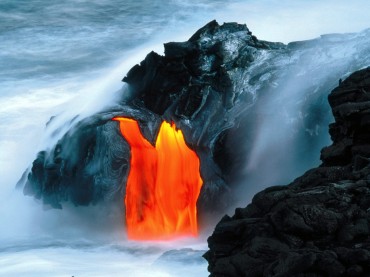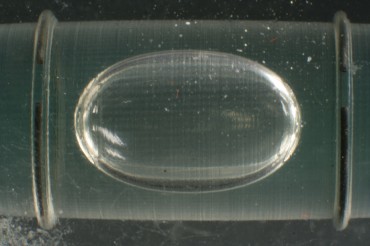
Lava flow from Kīlauea Volcano, Hawaii Photo: Mathilda Tómasdóttir

Level to check the horizontality / verticality Photo: David Torno
16.7.2014 – Issue 13 - Water – Hampe Michael, Sauter Florian – Studio
Panta Rhei and Plato's Revenge
Lecture by Michael Hampe
Philosophy is usually concerned with concepts; abstract concepts like
causality or space and time. Water is not so much a concept as a kind of
pre- or proto-concept: a word that was used before conceptual thinking
really began.
Pieces of water
If you cut this building into two parts, you do not get two buildings; you
get a broken building. Conversely, if you cut water, you get water. You can
divide water—if you do not go too far, like chemists do—into pieces of
water. This is called homogeneous division: elements can be divided homogeneously,
whereas individuals can only be divided heterogeneously.
The modern term for things that can be divided homogenously is mass.
Words like water, air, mud and earth are mass terms. These mass terms
were used in philosophy before concepts.
Earth: a type of water
The quite straightforward idea defended by Thales was that our earth is
frozen stuff that originates from something fluid. Water was a principle for
explaining why something is fluid; you explain why something has a given
property by referring to parts of that something. Thales probably saw
fluid coming out of a volcano, then solidifying to become like earth, and
therefore referred to the fluid emerging from a volcano as a kind of water.
He envisaged a kind of water beneath the earth’s surface. In philosophy,
many authors use the metaphor of ground or even the foundations of a
building as justification. It sounds paradoxical, then, to believe that something
firm rests on something that is not firm, something that is floating.
States of water
The idea of explaining something as an element is usually connected
with the word arche, which is sometimes translated as “principle” but
usually refers to “origin”. The idea of water being an arche before any
theory of evolution suggests that everything comes from water: if you
stretch water, you get steam and gas; if you compress water, you get
earth and firm things. We come to this conclusion because water is the
only element that exists in all aggregate states without any technical
manipulation. The realisation that clouds, steam and ice are all types of
water might prompt the belief that there is an original state of the element,
a fluid state that can be stretched into a gaseous thing or element,
or compressed into a firm, earth-like thing. So wetness and fluidity were
considered the most fundamental properties of all elements. The other
elements could then be deduced from water, making the idea that living
creatures with fluid and firm parts come from water very plausible. With
knowledge of how water can change, the idea of water as the origin of the
other elements and of living beings is plausible.
Swirl in the river
I started by saying that water is not an individual that can be divided by
heterogeneous division like a normal individual. Nevertheless, it becomes
an individual when it is contained in earth-like shapes such as rivers,
lakes or oceans. Once contained in a certain shape, water is no longer
homogenously dividable; you cannot cut a river or a sea into homogeneous
parts. Individualised water presents the paradox of something you
can come to again and again, but which is constantly changing. In this
case, water is not a substance, because substances are proper individuals
in which change takes place. The process philosophers turned this
around: a constant pattern of change is responsible for there being substances.
One example is a swirl in the river: the river is constantly moving
and the water is constantly changing, but a swirl looks like a more or less
defined figure in the river. Similarly, you could say that you are the person
you are because of the actions you do, rather than you do those actions
because of the kind of person you are.
The issue
This idea of constant change using the analogy of water was very common,
but it was not to Plato’s liking. Heraclitus saying, “We step into the
same rivers and we do not, we are and we are not” (DK 22 B 49 a) was
repulsive to him; it was a contradiction. Knowledge has to do with the
relation between properties and individuals. Now, if properties come and
go because everything changes, then you can never have knowledge
about anything. For Plato, this was a disaster; not having knowledge
about anything means having no orientation; it is like being at sea with
no horizon in sight, where nothing is fixed. It is no coincidence that the
process philosophers liked water and the sea so much, because the sea
is a place where it is extremely difficult to orientate yourself.
Plato’s concern
“I will tell you and it is not a bad description, either, that nothing is one
and invariable, and you could not rightly ascribe any quality whatsoever
to anything, but if you call it large it will also appear to be small, and light
if you call it heavy, and everything else in the same way, since nothing
whatever is one, either a particular thing or of a particular quality; but it is
out of movement and motion and mixture with one another that all those
things become which we wrongly say ‘are’—wrongly, because nothing
ever is, but is always becoming. And on this subject all the philosophers,
except Parmenides, may be marshalled in one line—Protagoras and
Heracleitus and Empedocles—and the chief poets in the two kinds of
poetry, Epicharmus, in comedy, and in tragedy, Homer, who, in the line
‘Oceanus the origin of the gods, and Tethys their mother’, has said that all
things are the offspring of flow and motion; or don’t you think he means
that?” Theaetetus, 152 d
Oceanos and Tethys, those very ancient gods or giants, are supposedly
the origin of all things, and Plato saw himself as fighting an army of thinkers
and poets who were all wrong, because they believed that everything
changes and did not realise that this viewpoint represents the loss of all
knowledge.
The solution
Plato’s alternative was the production of concepts. He presupposed that, in
order to have knowledge of something, we need to recognise it; we have to
be aware that this chair is the same chair we have seen before. In order to
be able to do this, we need a concept, the Greek ideos, according to which
we see this wood and metal before us as a “chair”. We could say that this
chair is a state of tree; the tree was first a germ, then it had leaves and it
ended up as something you can sit on. But we say it is a chair, not a state of
a tree. What, then, enables us to say that this piece of wood is not a state of
a tree, but a chair? It is the way, the idea, under which you consider it. And
where do these concepts come from? For Plato, they are not visible, they
are abstract. According to him, they come from mathematics; if I say this
wood is circular, the idea does not come from the wood itself, but I apply
it to the wood. So I make this chair into something constant by applying
abstract ideas to it. The way in which Plato avoided the flow of matter, the
wateriness of everything we experience, was to invent lots of abstract
structures that cannot change—at least not in the world of experience.
The interest in certainty
If you are not interested in knowledge, you do not need these abstract
structures. If you are only interested in experience, there is no problem with
things constantly changing. We might still be talking about the whole world
as element-like structures if we had not been interested in a certain kind of
knowledge: knowledge that does not change. The idea that there is something
that does not change has to do with an interest in certainty.
Question I: the horizon - the idea of a line
I don’t know when the water balance was invented, but it would be a good
anti-Platonic argument to say that the most fundamental geometric idea—
the straight line—comes from water, something commonly associated with
change. That’s a good point.
Question II: Ice
Ice plays a very small role in philosophical thinking about water, probably
because it is so hot in Greece that you hardly ever find ice. The Eskimos
would have probably first thought of water as ice melting.
Notes by Florian Sauter
Download article as PDF

